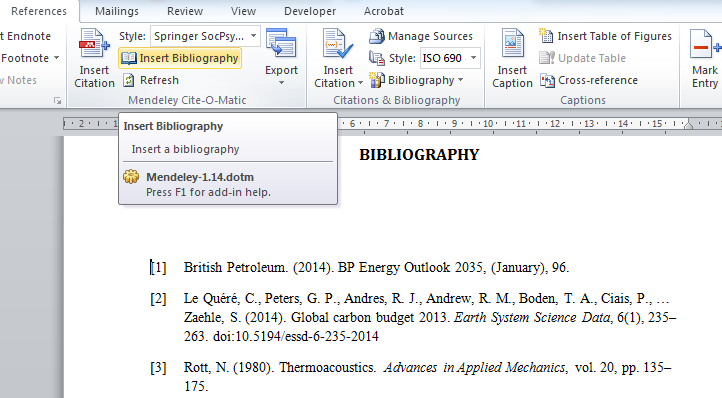

If my lab computer dies (unlikely for now, since my PI just bought me a shiny new iMac, but it's always a risk), I won't lose my precious papers. This is both convenient and smart - in addition to making my life easier when I need to take a project home with me, this automatically creates two backups of my reference database: one at home, one in the cloud. So, I can easily access all of my references and notes from home, even if I originally found all of the articles at lab. The Mendeley account preserves all of a user's citations, as well as custom user-generated notes and tags. I can log into my Mendeley account from any computer, and if that computer has Mendeley Desktop installed, I can sync the desktop client to my web account by entering my email address and password. Mendeley also automatically backs up all of my citation information to the cloud.
Mendeley for word 2010 how to#
I already know how to use PubMed in my browser I don't want my citation manager to make me learn a different way to search (even though Quosa's automated searches are pretty nifty). I find the interplay between Mendeley Desktop and the web importer to be just right - this comes in contrast to Quosa, for example, which tries to integrate web-based search into the reference manager, but feels clunky and awkward. When I want to pore through my references in more detail, I use Mendeley Desktop, which as a dedicated application feels 'separate' from my browser, and makes it easier for me to focus on the articles. Adding tags to a Mendeley citation takes just a few seconds and doesn't interrupt my browsing experience - I just close the tab/pop-up when I'm done. When I tried Zotero, I didn't like the way that it generated weird browser panes at the bottom of whatever page I was reading when I added a new reference. The Mendeley bookmarklet is unobtrusive - it opens a small pop-up window or a new tab every time I add a reference. This is similar to Zotero's browser-centric approach to reference management, but I prefer Mendeley's approach. Doing this prompts the user to enter tags and notes about the article right in the browser, which will be carried over to the desktop client as well. If I'm looking at an article on Pubmed or on a journal website, I can use the "Import to Mendeley" bookmarklet in Firefox or Safari to automatically add the citation to my Mendeley database. The Mendeley web importer is absolutely dreamy. Mendeley stands out, however, by linking the desktop client to web-based services that make my life much easier. The Mendeley Desktop program works "like iTunes for research papers." It keeps track of citation information and allows users to sort their references by category.

Mendeley shares features with other research bibliography tools like Papers, Zotero, and Quosa, but in general I find it to be more suited to my needs. After trying several options, I've found Mendeley to be the most useful. I've therefore been required to come up with a system for keeping track of all these papers.

Mendeley for word 2010 free#
I spend my free time in the lab scouring PubMed for relevant articles that will support my hypothesis. This grant has required a lot of background reading. (Emory Neuroscience students have about a 60% success rate at getting their NRSAs funded, so I have high hopes!) If I'm lucky, they'll decide to fund my proposal, and I'll receive additional support for my dissertation research. My goal is to submit the final product to the NIH sometime this summer. My grant is coming along, but I still have lots of work to do. My graduate program includes a course called Hypothesis Design and Scientific Writing, in which students work with faculty and peers to prepare an application for an NIH National Research Service Award (NRSA). This semester, I'm writing my first grant.


 0 kommentar(er)
0 kommentar(er)
